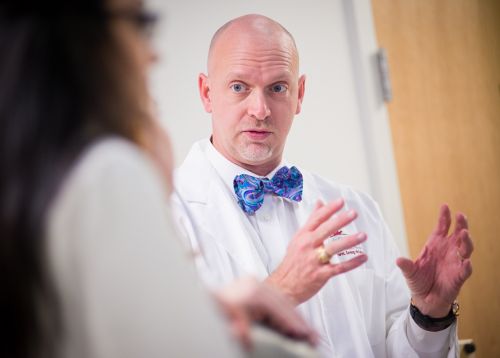St. Jude Family of Websites
Explore our cutting edge research, world-class patient care, career opportunities and more.
St. Jude Children's Research Hospital Home

- Fundraising
St. Jude Family of Websites
Explore our cutting edge research, world-class patient care, career opportunities and more.
St. Jude Children's Research Hospital Home

- Fundraising
Matthew J. Krasin, MD
Integrating modern radiation technologies, such as proton therapy and advanced imaging, into the pediatric treatment paradigm
Overview
For children with cancer, finding the most effective treatment often takes a multi-pronged approach that combines different types of therapies to maximize the chance for a cure while minimizing long-term side effects. In my work as a clinical researcher, I explore new targeting techniques for pediatric sarcomas and solid tumors using modern radiation modalities combined with novel new chemotherapies and surgery to achieve this goal. Delivering this therapy as part of an investigator-initiated clinical trial allows us to learn from these patients while delivering optimal care.
Krasin Research Summary
Overcoming cancer as a child does not end once treatment stops. The Department of Radiation Oncology works to ensure radiotherapy treatments are delivered in a way that maximizes the chance of a cure but also considers quality of life and long-term outcomes for these children as they grow into adulthood. To achieve this, I participate in and lead numerous investigator-led clinical trials that evaluate the use of proton therapy, both in terms of dose optimization and application in combinatorial therapeutic approaches, to advance care across different cancer types while minimizing long-term effects.
Current clinical trials include SJWT21 and RMS2021, both of which redefine the targeting and dosing paradigms for solid tumor treatments that incorporate proton beam radiation. With this work, our goal is to optimize our ability to guide patient-specific, targeted treatments.
To ensure our patients receive the most efficacious treatments, I collaborate with our physics faculty to identify patients at high risk for replanning to ensure there is adequate target coverage and acceptable normal tissue exposure in the planning process. Our approach uses knowledge from past retrospective studies that assess proton range uncertainty and planning challenges to inform a future, prospective study aimed at assessing patients’ need for proton treatment replanning.
For our patients that have experienced recurrence of disease, we have expanded our use of stereotactic body radiation therapy (SBRT) to incorporate hypofractionated proton beam treatment. Our hope is to refine the treatment paradigm for this patient population to better define the role, toxicity and benefit of proton beam in patients that may benefit from high dose, short course treatment to geometrically complex recurrent tumors.
To continually evaluate the long-term effects of treatment, my collaboration with the Departments of Oncology, Surgery and the Cancer Control and Survivorship Program will be particularly impactful and ensure our department is able to deliver care for the whole patient, not just a tumor.
Selected Publications
About Matthew J. Krasin
Dr. Matthew J. Krasin is a radiation oncologist with decades of experience treating a range of cancers while simultaneously evaluating the long-term impact of radiation therapies. Dr. Krasin seeks to optimize clinical care in radiation oncology with an eye toward improving outcomes and long-term quality of life for pediatric patients. As faculty member on the clinician scientist track within the Department of Radiation Oncology, Krasin dedicates time to both research and clinical efforts, maximizing high-quality care delivered at St. Jude while advancing the field’s understanding of late effects of radiation treatment.

Contact us
Matthew J. Krasin, MD
Member
Department of Radiation Oncology
MS 210, Room I3128
St. Jude Children's Research Hospital

Memphis, TN, 38105-3678 USA GET DIRECTIONS